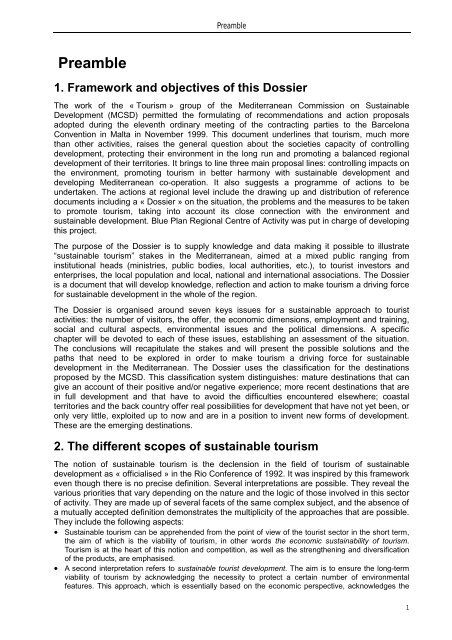dossier sur le tourisme et le développement durable
dossier sur le tourisme et le développement durable
dossier sur le tourisme et le développement durable
You also want an ePaper? Increase the reach of your titles
YUMPU automatically turns print PDFs into web optimized ePapers that Google loves.
Preamb<strong>le</strong><br />
Preamb<strong>le</strong><br />
1. Framework and objectives of this Dossier<br />
The work of the « Tourism » group of the Mediterranean Commission on Sustainab<strong>le</strong><br />
Development (MCSD) permitted the formulating of recommendations and action proposals<br />
adopted during the e<strong>le</strong>venth ordinary me<strong>et</strong>ing of the contracting parties to the Barcelona<br />
Convention in Malta in November 1999. This document underlines that tourism, much more<br />
than other activities, raises the general question about the soci<strong>et</strong>ies capacity of controlling<br />
development, protecting their environment in the long run and promoting a balanced regional<br />
development of their territories. It brings to line three main proposal lines: controlling impacts on<br />
the environment, promoting tourism in b<strong>et</strong>ter harmony with sustainab<strong>le</strong> development and<br />
developing Mediterranean co-operation. It also suggests a programme of actions to be<br />
undertaken. The actions at regional <strong>le</strong>vel include the drawing up and distribution of reference<br />
documents including a « Dossier » on the situation, the prob<strong>le</strong>ms and the mea<strong>sur</strong>es to be taken<br />
to promote tourism, taking into account its close connection with the environment and<br />
sustainab<strong>le</strong> development. Blue Plan Regional Centre of Activity was put in charge of developing<br />
this project.<br />
The purpose of the Dossier is to supply know<strong>le</strong>dge and data making it possib<strong>le</strong> to illustrate<br />
“sustainab<strong>le</strong> tourism” stakes in the Mediterranean, aimed at a mixed public ranging from<br />
institutional heads (ministries, public bodies, local authorities, <strong>et</strong>c.), to tourist investors and<br />
enterprises, the local population and local, national and international associations. The Dossier<br />
is a document that will develop know<strong>le</strong>dge, ref<strong>le</strong>ction and action to make tourism a driving force<br />
for sustainab<strong>le</strong> development in the who<strong>le</strong> of the region.<br />
The Dossier is organised around seven keys issues for a sustainab<strong>le</strong> approach to tourist<br />
activities: the number of visitors, the offer, the economic dimensions, employment and training,<br />
social and cultural aspects, environmental issues and the political dimensions. A specific<br />
chapter will be devoted to each of these issues, establishing an assessment of the situation.<br />
The conclusions will recapitulate the stakes and will present the possib<strong>le</strong> solutions and the<br />
paths that need to be explored in order to make tourism a driving force for sustainab<strong>le</strong><br />
development in the Mediterranean. The Dossier uses the classification for the destinations<br />
proposed by the MCSD. This classification system distinguishes: mature destinations that can<br />
give an account of their positive and/or negative experience; more recent destinations that are<br />
in full development and that have to avoid the difficulties encountered elsewhere; coastal<br />
territories and the back country offer real possibilities for development that have not y<strong>et</strong> been, or<br />
only very litt<strong>le</strong>, exploited up to now and are in a position to invent new forms of development.<br />
These are the emerging destinations.<br />
2. The different scopes of sustainab<strong>le</strong> tourism<br />
The notion of sustainab<strong>le</strong> tourism is the dec<strong>le</strong>nsion in the field of tourism of sustainab<strong>le</strong><br />
development as « officialised » in the Rio Conference of 1992. It was inspired by this framework<br />
even though there is no precise definition. Several interpr<strong>et</strong>ations are possib<strong>le</strong>. They reveal the<br />
various priorities that vary depending on the nature and the logic of those involved in this sector<br />
of activity. They are made up of several fac<strong>et</strong>s of the same comp<strong>le</strong>x subject, and the absence of<br />
a mutually accepted definition demonstrates the multiplicity of the approaches that are possib<strong>le</strong>.<br />
They include the following aspects:<br />
• Sustainab<strong>le</strong> tourism can be apprehended from the point of view of the tourist sector in the short term,<br />
the aim of which is the viability of tourism, in other words the economic sustainability of tourism.<br />
Tourism is at the heart of this notion and comp<strong>et</strong>ition, as well as the strengthening and diversification<br />
of the products, are emphasised.<br />
• A second interpr<strong>et</strong>ation refers to sustainab<strong>le</strong> tourist development. The aim is to en<strong>sur</strong>e the long-term<br />
viability of tourism by acknow<strong>le</strong>dging the necessity to protect a certain number of environmental<br />
features. This approach, which is essentially based on the economic perspective, acknow<strong>le</strong>dges the<br />
1
















